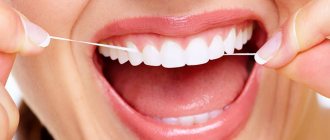Causes of bad breath
Halitosis occurs when the exhaled air contains volatile compounds with an unpleasant odor. Their sources can be 1,2,3,4,6:
- some food products (garlic, onions, cabbage);
- products of carbohydrate fermentation (fermentation);
- decaying food debris;
- waste products of bacteria.
However, the main cause of bad breath is the production of hydrogen sulfide by anaerobic bacteria in the mouth. Their peculiarity is their ability to live without oxygen and in places that are difficult to reach with a toothbrush, for example, on the back surface of the tongue and the back wall of the pharynx, between the teeth, in gum pockets, on the tonsils, in the natural grooves of the teeth1,2,3.
to come back to the beginning
Risk factors
Factors that promote the growth of oral bacteria can cause halitosis. They are conventionally divided into local and general1.
In 80-90% of cases, halitosis is found to be caused by one of the following reasons1,2,3,4,6:
- caries and its complications;
- inflammation in the periodontium;
- diseases of the oral mucosa;
- poor hygiene, especially poor cleaning of teeth, tongue, orthopedic and orthodontic devices (prostheses or braces) - neglect of oral care leads to the accumulation of food debris, which is food for microbes, between the teeth, near the gums, on the back of the tongue, on the elements of the device ;
- deficiency of saliva with xerostomia or “dry mouth syndrome” - with a decrease in salivation, the natural cleansing of the oral cavity is disrupted and favorable conditions are created for the proliferation of microbes.
If local causes of halitosis are associated with the oral cavity, then general ones are associated with the condition of the whole organism1,2. But indirectly, general factors can influence oral health by promoting mucosal dryness and bacterial growth1,2.
Thus, the following factors can contribute to the proliferation of bacteria and the appearance of bad breath:
- Nutritional features. Eating large amounts of protein (meat, fish), coffee, carbonated drinks (sweetened with sweeteners) and alcohol promotes the growth of bacteria that produce “fragrant” volatile compounds1,2,3.
- Smoking. Although nicotine and tobacco combustion products have an unpleasant odor, this is not the only cause of halitosis in smokers. Due to smoking, the oral mucosa becomes dry, the number of bacteria on it increases, and inflammatory processes in the periodontium may occur1,2,3. All this contributes to the appearance of bad breath.
- Hormonal changes. Women may experience bad breath during menstruation. “Menstrual breathing” occurs due to fluctuations in the level of hormones that affect the properties of saliva, making it more viscous2. In addition, stress hormones can influence the growth of oral bacteria that produce volatile compounds2.
- Some medications , such as antibiotics and hormones (glucocorticosteroids), reduce saliva production, which promotes the growth of anaerobic bacteria3.
to come back to the beginning
Digestive problems
Often true halitosis occurs as a consequence of serious dysfunctions of the gastrointestinal tract, as well as metabolic disorders. If you can rule out causes that are related to the respiratory system, be sure to undergo a complete examination of the digestive organs.
If a child has a sour smell from his mouth, this may indicate problems with the upper intestines and stomach. This often happens in the chronic course of gastroesophageal reflux, when a certain amount of undigested food soaked in gastric juice is thrown into the esophagus. This causes an unpleasant belching with a characteristic odor.
Also, such a symptom sometimes indicates developing gastritis, duodenitis, and even the beginning of an ulcerative process. Helicobacter infection cannot be ruled out, since the duodenum and stomach are the ideal place in which its colonies develop.
A bad odor can also occur when digested food masses stagnate in the intestines due to the accumulation of helminths (worms) in it.
An unpleasant odor often occurs due to intestinal dysbiosis - a pathological condition that accompanies increased gas formation, bloating, and frequent diarrhea. In some cases, such a disorder may be almost asymptomatic, with the exception of bad breath.
If there is a pronounced smell of raw liver in a child, one can immediately suspect the presence of hepatitis or liver failure. Also, if this organ is damaged, a rotten egg (hydrogen sulfide) smell may occur.
An alarming symptom is the smell of ammonia from the mouth of children. In this case, it is imperative to check the condition of the urinary system and in particular the kidneys.
How does halitosis manifest?
Constant bad breath is one of the symptoms of periodontal disease2. With physiological halitosis, when there are no dental or general diseases, the unpleasant odor is a temporary phenomenon. It appears after eating specific foods (onions, garlic) and disappears some time after eating and brushing teeth6. If you notice bad breath in the morning or after intense physical activity, it is likely that you are not producing enough saliva or it is drying up quickly due to breathing through your mouth at night or during exercise6.
to come back to the beginning
Causes not related to diseases
It happens that an absolutely healthy person develops a metallic taste in the mouth. The reason for this may be heavy metal poisoning at work, dehydration, addiction to dietary supplements or taking vitamins.
A person himself is able to identify the etiology in this case if he traces the cause-and-effect relationship of being, for example, in a paint factory workshop with the appearance of a metallic taste in the mouth. You just need to be more attentive to your body and not abuse dietary supplements.
We also must not forget that metal ions can enter the body through the skin, so an iron taste in the mouth may appear as a result of constant skin contact with iron, for example, as a result of working with it or when wearing metal jewelry such as chains and bracelets.
A metallic taste may occur as a result of eating it. It comes from old water pipes or metal utensils. To identify this reason, it is enough to let tap water sit in a glass cup for several hours and see if sediment has formed at the bottom. It’s better to avoid metal utensils altogether.
Treatment
Often a person tries to get rid of bad breath on his own - using refreshing sprays or chewing gum. But this approach does not eliminate the causes and acts temporarily - complete disappearance of the unpleasant odor can only be achieved under the supervision of a doctor, who will determine the causes and select individual treatment2,5.
If halitosis is confirmed by tests performed by a doctor, it is considered true. But sometimes a person is sure that his breath is bad, although those around him do not smell anything. Doctors refer to this condition as false halitosis or pseudohalitosis1,3.
As a rule, people with bad breath should first consult a dentist1. For physiological halitosis, proper oral care is taught, including brushing the teeth and tongue1,4,6. If the problem of bad breath lies in dental diseases, then the doctor1.6:
— carries out professional hygiene — removes dental plaque;
- eliminates foci of infection - treats or removes decayed teeth, cleans periodontal pockets;
— prescribes therapy aimed at restoring saliva deficiency;
— in case of inflammatory processes, prescribes drug treatment.
to come back to the beginning
Diabetes
Diabetes mellitus is characterized by a violation of the absorption of glucose by the body's cells, which ultimately accumulates in the blood, causing the destruction of the walls of blood vessels in all internal organs and skin.
It is this manifestation of diabetes that can cause a taste of blood in the mouth. That is, the thinnest vessels of the mucous membrane of the mouth and gums burst and bleed. Symptoms of diabetes include constant thirst and long-lasting wounds. If a person experiences all of these manifestations at once, he needs to urgently undergo examination by a doctor and receive a referral for treatment. Otherwise, it may end in diabetic coma and death.
Metrogyl Denta® for inflammatory diseases of the oral cavity accompanied by halitosis
Since one of the causes of bad breath is inflammatory periodontal diseases2, one of the directions of therapy should be the treatment of inflammatory diseases of the oral cavity.
Dental gel Metrogyl Denta® is a drug that can be used for the treatment and prevention of most infectious and inflammatory diseases of the oral cavity, in particular gingivitis and periodontitis7. It contains two active antimicrobial components - the antibiotic metronidazole and the antiseptic chlorhexidine, which are effective against the main anaerobic bacteria that cause periodontal diseases7.
to come back to the beginning
Prevention methods
To avoid the occurrence of halitosis, it is recommended6:
- Reduce the amount of dental plaque. It is important to promptly clean teeth, dorsum of tongue, dentures and braces from bacteria and accumulated food. To do this, you need to use not only a toothbrush, but also dental floss, brushes and mouthwash.
- Balance your diet - limit your intake of carbohydrates (sweets), which oral bacteria use as nutrients.
- Fight bad habits - limit the number of cigarettes you smoke or give up smoking completely, drink less coffee and alcoholic beverages.
- Increase your fluid intake - this makes saliva production easier.
Bad breath should not lead to problems in communication, especially since it is not difficult to deal with. Professional teeth cleaning, treatment of periodontal diseases and careful personal oral hygiene help get rid of halitosis in 80.7% of patients. Therefore, the right decision would be to make an appointment with the dentist as soon as you notice bad breath. If symptoms persist after eliminating dental causes, you should seek help from a therapist1,5,6.
Preventive measures
To promptly prevent the appearance of halitosis in your baby, you must follow a few simple rules:
- Brush your baby's teeth thoroughly twice a day, starting when the first tooth emerges. It is necessary to teach your child how to use a brush and toothpaste correctly to remove plaque from the surface of the teeth.
- Adhere to the age-specific nutrition system, introduce vegetables, fruits, and foods rich in phosphorus and calcium into your child’s diet.
- Eliminate sugar, chocolate, and other sweets from your diet and replace them with honey.
- Give your child plenty of fluids, especially drinking water.
- Visit your dentist regularly to prevent the development of caries.
»
Bibliography
- Khitrov V. Yu., Zabolotny A. I. Halitosis - a medical and social problem // Practical medicine. - 2009. - No. 1 (33). — P. 12-17
- Gorobets S. M. et al. Risk factors for the development of halitosis (review) // Crimean Therapeutic Journal. — 2022. — No. 3. — P. 13-18
- Maksimova E.V., Stetsyuk N.S., Shelikhova E.O. Halitosis as a medical and social problem // Crimean Therapeutic Journal. — 2020. — No. 1. — P. 32-37
- Temkin E. S., Churikova A. S. Halitosis - modern diagnostic methods and their prospects // Volgograd Medical Scientific Journal. — 2022. — No. 3. — P. 15-18
- Vinogradova T. G. Bad breath - halitosis, causes and treatment options // Bulletin of VSMU. - 2014. - T. 13. - No. 2. - P. 129-131
- Ushakov R.V. et al. Modern methods of diagnosis, elimination and prevention of halitosis // Textbook: Moscow. - 2016. - 81 p.
- Instructions for the medical use of the drug Metrogyl Denta® Dental gel // Registration number P N015982/01 // State Register of the Russian Federation. – URL: https://grls.rosminzdrav.ru/Grls_View_v2.aspx?routingGuid=9bc9a05c-d28b-473d-b8d4-60e8b8323762&t=
Modern aspects of the prevention of diseases of the oral mucosa in patients with xerostomia / L.D. Weisheim, L.M. Gavrikova, T.N. Gomenyuk, T.V. Motorkina, L.N. Shcherbakov, S.M. Dubacheva, G.V. Sorokoumova//Medicinal Bulletin.—2013.—No. 2 (50). -WITH. 32-37.









